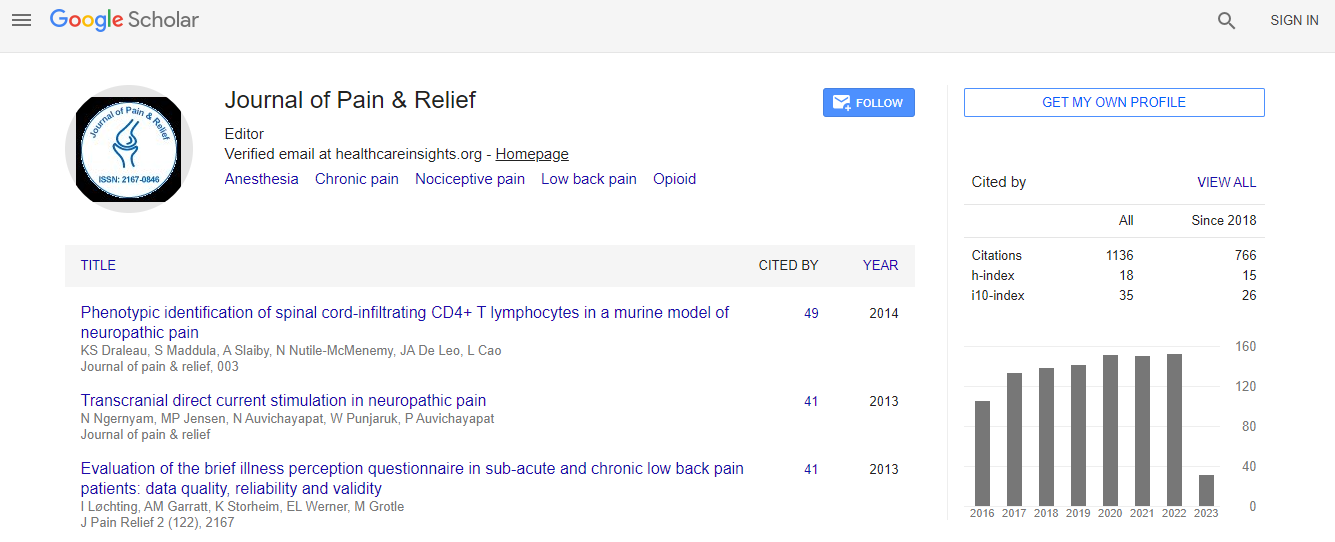Our Group organises 3000+ Global Conferenceseries Events every year across USA, Europe & Asia with support from 1000 more scientific Societies and Publishes 700+ Open Access Journals which contains over 50000 eminent personalities, reputed scientists as editorial board members.
Open Access Journals gaining more Readers and Citations
700 Journals and 15,000,000 Readers Each Journal is getting 25,000+ Readers
Google Scholar citation report
Citations : 1583
Journal of Pain & Relief received 1583 citations as per Google Scholar report
Journal of Pain & Relief peer review process verified at publons
Indexed In
- Index Copernicus
- Google Scholar
- Open J Gate
- Genamics JournalSeek
- Cosmos IF
- RefSeek
- Hamdard University
- EBSCO A-Z
- OCLC- WorldCat
- Publons
- Geneva Foundation for Medical Education and Research
- Euro Pub
- ICMJE
Useful Links
Recommended Journals
Related Subjects
Share This Page
Dealing with metastatic bone disease in lung cancer and prevention of SREs and pain
International Conference on Pain Research & Management
Vera Hirsh
McGill University, Canada
Posters & Accepted Abstracts: J Pain Relief
Abstract
Metastatic bone disease occurs in patients with lung cancer, in 30-40% of patients at the time of diagnosis and as the patients live longer, incidence of bone metastases increases. Bone metastases have debilitating consequences called skeletal related events (SREs), i.e. fractures, surgery and radiation to bone, spinal cord compression and hypercalcemia, which then result in significant comorbidities, pain, loss of autonomy, reduced quality of life and increased healthcare costs. In randomized phase III trials in patients with solid tumors, 40-50% of patients developed SREs, 2.71 SREs per patient per year. Mechanism of action of nitrogen containing bisphosphonates and RANKL inhibitor and their efficacy in patients with lung cancer will be discussed. Trial of zoledronic acid (ZA) in patients with bone metastases from non-small cell lung cancer (NSCLC) and other solid tumors versus placebo will be described, including the impact of the reduction of SREs on survival pain and cost of managing lung cancer patients. A phase III trial of denosumab vs. ZA in the treatment of bone metastases in patients with advanced cancers (excluding breast and prostate cancer) or multiple myeloma, SREs and pain outcomes, analgesic use will be described. The proportion of patients with no or mild pain at baseline reporting moderate or severe pain by visit, pointing out that denosumab delayed the moderate or severe pain more effectively than ZA and how many patients in each arm shifted to strong opioid use. The conclusion of this trial was that a better pain control was achieved with denosumab compared to ZA. New bone targeted agents, i.e. dasatinib, sotatercept, cabozantinib and RAD 223 are under investigation.Biography
Email: vera.hirsh@muhc.mcgill.ca

 Spanish
Spanish  Chinese
Chinese  Russian
Russian  German
German  French
French  Japanese
Japanese  Portuguese
Portuguese  Hindi
Hindi 
